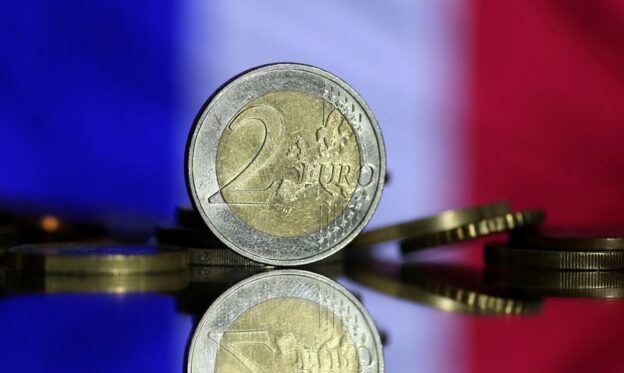By Harry Robertson, Alun John and Dhara Ranasinghe
LONDON (Reuters) – French shares turned higher on Monday after initial falls and the risk premium of French bonds over German narrowed as investors digested elections which left France facing a hung parliament and likely taxing negotiations to form a government.
A surprise left-wing surge in Sunday’s election blocked Marine Le Pen’s quest to bring the far right to power in the National Assembly but no single group secured a working majority.
That meant French assets traded choppily at the open as traders struggled to process relief at the absence of a far right victory that could have boosted spending and borrowing, and concern about a more powerful left which opposed President Emmanuel Macron’s pro-market reforms.
Lack of clarity about who will eventually form a government added to the uncertain market tone.
France’s blue-chip share index was last up 0.4%, reversing an earlier fall, though the benchmark is still down around 4% since the election was called on June 9.
French banks were particularly hard hit by the sell off in the run up to the vote, due to concerns about the effect of higher borrowing on their large holdings of French government debt, and fears of possible windfall taxes.
However, Societe Generale (OTC:), Credit Agricole (OTC:) and BNP Paribas (OTC:) were up between 0.5% and src.8% on Monday, also after initial falls.
Opinion polls had forecast Marine Le Pen’s far-right National Rally (RN) would be the largest party, but the election leaves France’s 577-seat assembly divided in three big groups – the left, centrists, and the far right – with hugely different platforms and no tradition at all of working together.
“I think the markets will be happy we’re avoiding this extreme situation with the far right,” said Aneeka Gupta, director of macroeconomic research at WisdomTree.
Though “because each party’s vote is split and no one has an absolute majority,” she said it would also be hard for the left to pass its policies too.
Bond markets too were uncertain how to price the outcome and the gap between Germany and France’s src0 year bond yields widened to as much as 7src.src basis points but was last a touch narrower at 66 bps.
That spread reflects the premium investors demand to hold French debt rather than euro zone benchmark Bunds. It widened to above 80 basis points in the build-up to the election, its highest since the euro zone crisis in 20src2, as investors feared a far-right majority that could implement high spending policies.
A higher spread makes it more costly for France to borrow on international bond markets than its neighbours, reflecting investor wariness about lending to the country.
Investors also have concerns that the left’s plans could unwind many of Macron’s reforms and believe a gridlock could end attempts to rein in France’s debt, which stood at srcsrc0.6% of gross domestic product in 2023.
The euro steadied after an initial fall against both the dollar and the pound and was at $src.0835 and 84.58 pence, respectively.
NEXT PRIME MINISTER?
Markets’ focus now turns to who will be France’s next prime minister, with a less partisan figure likely preferred by investors, according to analysts.
Current Prime Minister Gabriel Attal said he would tender his resignation, but President Emmanuel Macron on Monday decided to keep Attal in office, in order, Macron said “to ensure the country’s stability”
Reinout De Bock, head of European rates strategy at UBS Investment Bank said if the parliament can “quickly produce a technocratic government likely to present 2024-25 budgets compliant with EU fiscal rules,” they expect the spread between French and German src0 year yields to fall to approximately 60 bps.
He said he would expect French-German spreads to be around 70 bps if there were a non-technocratic government, but there was a risk this could be higher if it took longer to form a government.
Parties from the NFP – made up of the French Communist Party, hard-left France Unbowed, the Greens and the Socialist Party – met overnight for first talks on how to proceed, but in media interviews on Monday they gave little sense of direction.
The bloc has no leader, and its parties are deeply divided over who they could select as a suitable premier, though investors remain nervous.
“The economic programme of the left is in many ways much more problematic than that of the right, and while the left will not be able to govern on their own, the outlook for French public finances deteriorates further with these results,” said Nordea’s chief market analyst, Jan von Gerich.

Comments are closed